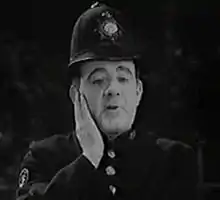Robb Wilton
Robb Wilton (28 August 1881 – 1 May 1957), born Robert Wilton Smith, was an English comedian and comic actor who was famous for his filmed monologues in the 1930s and 1940s in which he played incompetent authority figures. A trademark was to put his hand over part of his face at the punchline.
Robb Wilton | |
|---|---|
 from British Pathé archive,1932 | |
| Born | Robert Wilton Smith 28 August 1881 |
| Died | 1 May 1957 (aged 75) |
| Nationality | British |
| Occupation | comedian |
Life and career
Wilton was born in Everton, Liverpool, and had a dry Lancashire accent which suited his comic persona as a procrastinating and work-shy impediment to the general public. Wilton's comedy emerged from the tradition of English music hall, especially popular in the North of England, and he was a contemporary of Frank Randle and George Formby, Sr.. He portrayed the human face of bureaucracy; for example, playing a policeman who shilly-shallies his way out of acting upon a reported murder by pursuing a contrarian line of questioning. Wilton, rubbing his face in a world-weary way, would fiddle with his props while his characters blithely and incompetently 'went about their work', his humour embodying the everyday and the absurd – and the inherent absurdity of the everyday.
He has been acknowledged as an influence by fellow Lancashire comedians Ken Dodd and Les Dawson, and the film historian Jeffrey Richards has cited him as a key influence for the TV sitcom Dad's Army (1968–1977); he made several monologues in the person of a layabout husband, who wryly takes part in the Home Guard. His gentle, if pointed, manner of comedy is similar to the wistful adventures of the more famous Walmington-on-Sea platoon.
Wilton's most popular catchphrase was "The day war broke out...". The phrase was taken from his opening routine for radio which was "The day war broke out, my missus said to me, 'It's up to you...You've got to stop it'. I said, 'Stop what?'. She said, 'The war.'" "Ooh, she's a funny woman!"
Another frequently reconstructed Wilton monologue was the 'fire station sketch', in which a bumbling fire officer takes a call reporting the location of a fire, but is sidetracked into trying to remember where it is instead of taking the details of the conflagration: "Grimshaw Street... No, don't tell me... Oh, I could walk straight to it...", finishing with the classic line to the long-suffering householder: "Can you keep it going 'til we get there?"
Possibly his best-known character, Mr Muddlecombe, an incompetent J.P., appeared in a number of radio series during the 1930s and 1940s and was known for the phrase "You shouldn't have done that!". He would also frequently make the comment: "Ee, what a to-do!"
He was also a stand-up comedian and one of his jokes was: "A bloke went into a pub and asked, "What soft drinks have you got, barman?" Barman says, "I've got some without vanilla, some without lime, some without lemon. Ah, and one with peppermint!" "Oh, damn", says the customer, "That's the very one I wanted without!"
In October 1928, he appeared in a short film, The Fire Brigade, made in the Phonofilm sound-on-film process. He then appeared in several films from 1934, generally in supporting comic roles. His last film appearance was in the Arthur Askey vehicle The Love Match in 1955.
Wilton was inducted into the exclusive entertainers' fraternity, the Grand Order of Water Rats and served as its "King Rat" in 1947.[1]
He was a grand-uncle of actor Robin Askwith.
Selected filmography
- Love, Life and Laughter (1934)
- Look Up and Laugh (1935)
- It's Love Again (1936)
- Calling the Tune (1936)
- Two's Company (1936)
- Stars on Parade (1936)
- Mother, Don't Rush Me (1936)
- The Interrupted Honeymoon (1936)
- Fine Feathers (1937)
- Take My Tip (1937)
- The Love Match (1955)
External links
| Wikiquote has quotations related to: Robb Wilton |
- Robb Wilton at IMDb
- Robb Wilton.The Policeman Video at TV-Click